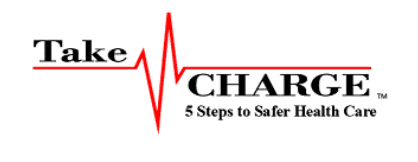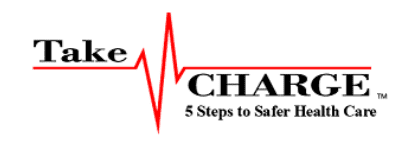An Insider’s Perspective
by: Stephanie Schulz, BCPA A Voice for You Patient Advocacy https://www.avoiceforyouadvocacy.com/
After spending 30 years working in the pharmacy industry, it is clear to me why keeping a current medication list is vital. Along with a record of your medical history, this is part of Step 2 of the Take Charge Campaign: 5 Steps to Safer Healthcare. This is the step that is most near and dear to my heart.
While working in retail pharmacy, I often heard statements like these from our customers:

“I don’t need to keep a record of my medications; all my bottles of pills and my inhalers are right here in my cabinet. I know I take two white ones, the blue one and the yellow one in the morning…”
“My doctor knows what I am taking. It is on my list every time I go to an appointment”.
During an emergency, when you need to go to an urgent care, emergency department, or hospital, do you take your cabinet full of medications with you? Would you be able to recall the names of each of your medications along with the dose and how you use them, not just the color?
That list that your doctor has in your medical record can quickly become outdated without regular communication. Your doctor may have told you to change your dose temporarily while using another medication or to cut it in half due to side effects or symptoms you were experiencing. You may have stopped taking one because it was too expensive, or you didn’t like the side effects. Medications that you no longer take are often not removed from your record, but they will still be listed as historical medications.
I have worked with countless families over the last few decades who struggled trying to figure out which medications mom or dad were taking each day after they were admitted to a hospital. They would find a shoebox full of bottles in one room, some in their bedroom or bathroom. Often, they would find multiple bottles of the same medications because they hadn’t been taken correctly or at all. During transitions of care from emergency rooms to hospitals, to back home, or to a long-term care facility, old medications listed in their doctors’ records were often accidentally activated again and refilled.
One of the easiest solutions to help reduce your chance of falling victim to a medication related error is to always keep an updated list of all the medications you take. Include the name, the dose and how you use it. Relying on the color or shape can cause challenges, because the same medications may look different when manufactured by a different company. Keep your medication list, and other important information in a safe place in your home or with your support person.
When you see your doctor, take that list with you. Update it every time there is a change in what you take or how you take it. Take your list to the pharmacy when you pick up your refills, it can help to ensure that you receive the right medication. You could even ask your pharmacy about programs they may have to help keep your medications organized. Those types of programs often include a medication list and can be provided to you each time your medications are refilled.
Communication is important for your safety. Having your medication list complete and available is one of the most effective tools of communication to prevent a medication error from happening to you. A Patient Advocate can be helpful in organizing medical records and medication lists as part of their services to help protect your safety.
For more information about the Take Charge Campaign visit their website. It is full of resources to help everyone complete the 5 steps to Safer Healthcare. https://takecharge.care/step-2/ Also visit www.AVoiceForYouAdvocacy.com for more information about how our advocacy services can help you!
About the Author
Stephanie Schulz, BCPA is a Board Certified Patient Advocate, who has worked in the pharmacy industry for 30 years. First as a Certified Pharmacy Technician and after 15 years moving into management becoming the General Manager for two locations of an independently owned pharmacy. Her specialties include retail and long term care pharmacy services educating customers about medication, billing, insurance and the general health care system. https://www.avoiceforyouadvocacy.com/

